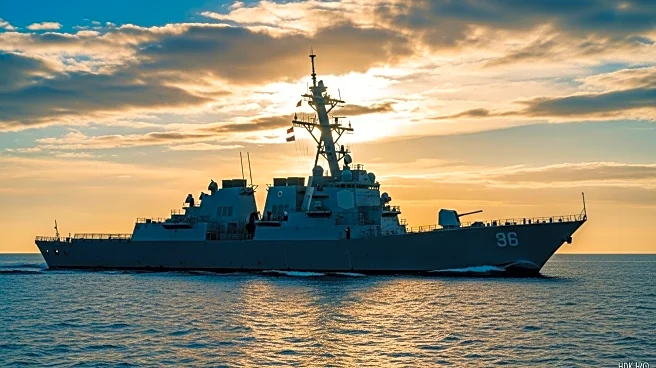What's Happening?
The Taiwan Strait has recently seen increased naval activity involving allied warships. On September 12, the Arleigh Burke Class destroyer USS Higgins and the Type 23 frigate HMS Richmond transited the strait, following earlier passages by Australian and Canadian vessels. This movement was part of a broader series of naval exercises in the region, including operations by the Royal Navy carrier HMS Prince of Wales and South Korean naval forces. The transit of USS Higgins and HMS Richmond occurred amidst objections from the People's Liberation Army Eastern Theater Command, which monitored the naval movements. The passage of HMS Richmond was initially speculated to be vetoed by British Foreign Minister David Lammy, but this was not the case as Lammy was replaced a week prior to the transit.
Why It's Important?
The transit of allied warships through the Taiwan Strait is significant due to the strategic importance of the region and the ongoing geopolitical tensions involving China. The presence of U.S. and British naval forces underscores their commitment to maintaining freedom of navigation in international waters, which is a critical aspect of global maritime security. This action may be perceived as a challenge to China's territorial claims and military presence in the area, potentially escalating diplomatic tensions. The involvement of multiple nations in these naval exercises highlights the importance of international cooperation in addressing security challenges in the Asia-Pacific region.
What's Next?
As the carrier strike group led by HMS Prince of Wales returns to Portsmouth, it is expected to encounter a more complex security environment. Continuous training at sea with allies has ensured operational readiness, but the evolving geopolitical landscape may require further strategic adjustments. The ongoing naval activities in the Taiwan Strait and surrounding areas are likely to continue, with potential diplomatic responses from China and other regional stakeholders. Future naval exercises and transits may further test international relations and the balance of power in the region.
Beyond the Headlines
The increased naval presence in the Taiwan Strait may have long-term implications for regional security dynamics. It could lead to a shift in military strategies and alliances, as countries seek to bolster their defense capabilities in response to perceived threats. The situation also raises ethical and legal questions regarding the interpretation of international maritime law and the rights of nations to conduct military operations in contested waters. The ongoing developments may influence future policy decisions and diplomatic engagements between the involved nations.









